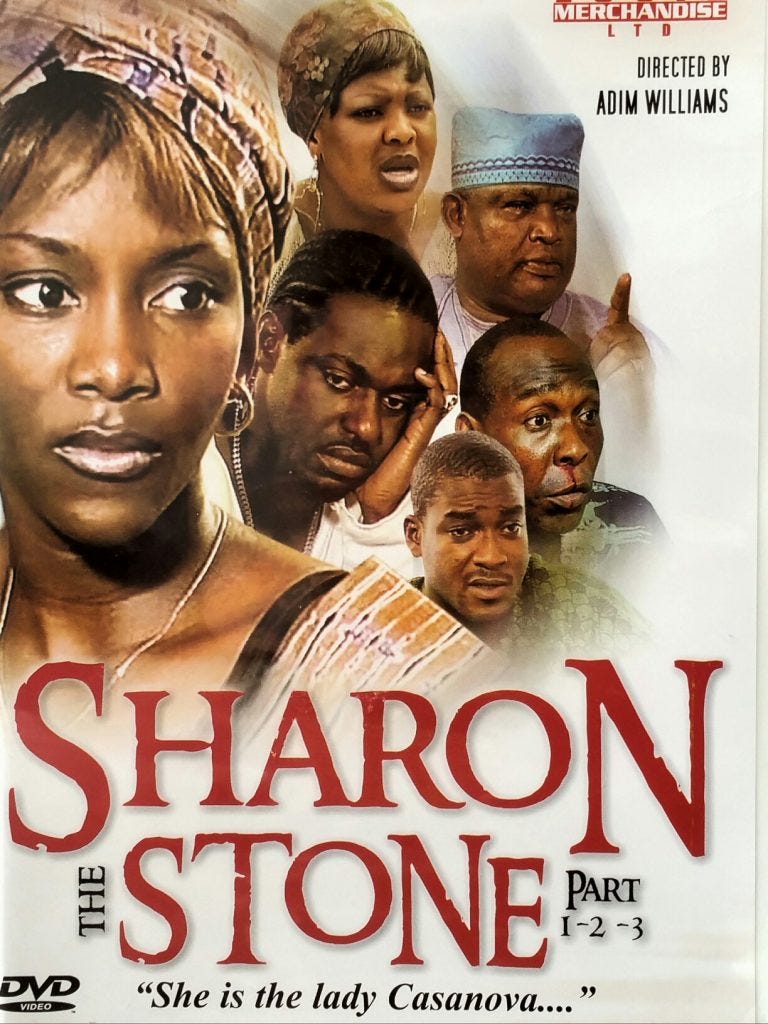Retro Nolly: Genevieve Nnaji Delivers a Starmaking Performance in 'Sharon Stone'.
In Adim Williams's Drama, Sharon Stone, Genevieve Nnaji Embraced Freedom and Agency in a Male–Dominated World
Retro Nolly is a weekly series of retrospective reviews of classic Nollywood films by Seyi Lasisi. We will be looking at these films with modern eyes, dissecting what made them unique and how they speak to today’s filmmaking, culture and society.
When I reviewed Zeb Ejiro's Domitilla, which was produced in 1996, I made a salient point worth reiterating: Domitila, and by extension other feminocentric films, hints at a filmmaking epoch when unruly female leads casually dominate the screen. Adim Williams’s Sharon Stone, which came six years after Ejiro’s film, continued that storytelling approach of centring unruly women. Though there was an infiltration of patriarchal tone in telling these feminine stories, they did intimate Nigerians to women's stories.
Sharon Stone, played by Nollywood's most celebrated star, Genevieve Nnaji, is embedded in the morally sensitive story of the eponymous lead, who is juggling multiple partners with distinct demands while attending school and hiding from an unexplored family crisis. In Sharon's relationship life, there is Henry, who is introduced in the opening scene; Dallas (Emeka Eyiocha), a fellow student in her school; Chief Uche (Peter Bruno) an unbelievably liquid man; Tony (Kunle Coker) a Colonel in the Nigerian army. As her relationship with these men introduces multiple conflicts in her life, her friend, Kate consistently reproves them with the vigour of a friend with valid concern.
The film sermonises Sharon's attitude as being morally degraded and presents the men as being sin-free. With the moral focus more on Sharon, the film reiterates societal perception of women who embrace their sexual experiences and expression. Prone to gagging what it considers unorthodox, women's autonomy, especially sexually, is scorned at.
The film closes with all of Sharon’s supposedly jilted boyfriends laughing hard at her, and this represents not just the men's deep-rooted scorn for her freedom, but also our society’s for women of her kind.
Nnaji's career has often been punctuated with memorable moments. In Sharon Stone, where she delivers her star-making performance, the memorable moments come during moments of conflict as Nnaji's performance portrays how unfazed Sharon is by these ill-conceived societal thoughts and conventions. For the male actors, there are scanty memorable moments or performances. Coker is playing the role of a Nigerian Colonel, and while the script doesn't understandably explore this, Coker's acting is bereft of the fast-paced and dramatic appearance of a soldier.
As I have come to realise over my short stint of writing these retrospective reviews, New Nollywood's storytelling problem is a familiar enigma. Though enjoying wide acceptance from Nigerians, these Old Nollywood films, technical issues aside, are often layered with numerous inexplicable characters and scenes. And this begs the question: With the relative ascendancy the industry has witnessed, why are we still having storytelling problems in Nollywood?



